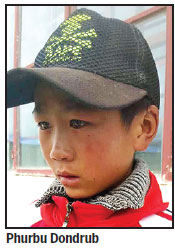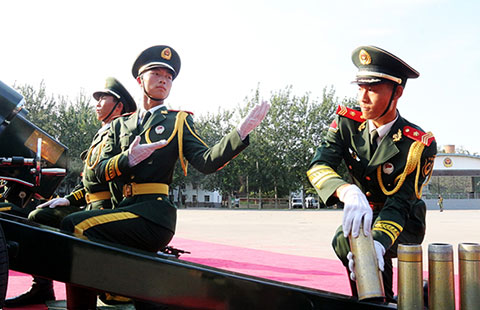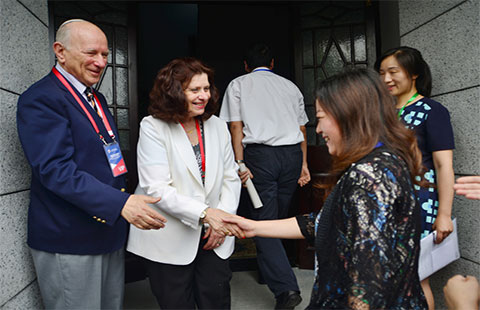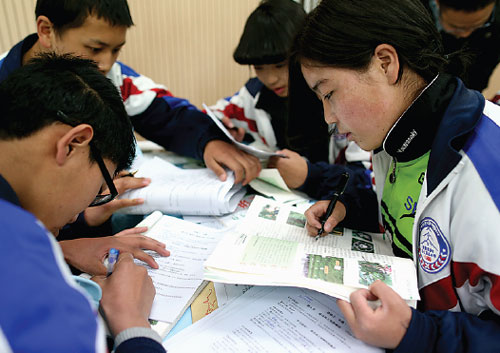Region takes to schooling, but process will take time
Updated: 2015-08-31 07:49
By Da Qiong and Luo Wangshu in Lhasa(China Daily USA)
|
|||||||||
Education in Tibet was once considered a privilege for nobles only.
For 73-year-old Tenzin, a former slave, the echoes of that tradition hit home: He didn't have a chance to enter school until he was 16 years old.
"I left home before sunrise and came back after sunset, herding sheep for my master. There were more than a thousand sheep and only two shepherds," the native of Xigaze said, adding that he never thought of attending school at the time.
"It was another life, not for people of my kind," he said.
In 1951, the year he turned 16, he witnessed the peaceful liberation of Tibet. Tenzin attended a government-run adult school in his early 20s to learn how to read and write.
Now the former slave has three grandchildren, the eldest of which has graduated from a university.
"In old times, slaves were not allowed to learn," Tenzin said.
The change in Tenzin's life is a drop in the ocean for the improvement of thousands of Tibetans' lives brought by education over the past 50 years.
According to the Education Bureau of the Tibet autonomous region, more than 95 percent of Tibetans were either illiterate or semi-literate before 1951.
In 1965, the region had 56,000 elementary school students and 1,359 middle school students. More than 12,000 students attended adult schools, according to the bureau.
The bureau's figures also show that through last year, almost all school-age children attended elementary and middle school, nearly 60 percent received early childhood education and more than 73 percent attended high schools. The average time for receiving an education in the region has grown to eight and a half years.
Free education
"To further encourage children from her dsmen's and farmers' families to go to school, the region has provided 15 years of free education, from kindergarten to high school," said Zhu Yun, vice-head of the region's Education Bureau.
The regional government began waiving urban students' tuition and other expenses in the compulsory education period (from the first to 9th grades) in 2007 and also provided free textbooks and new homework books to students.
In 2011, high schools began to be cost-free. In 2012, this policy was extended to urban kindergartens.
Since then, students who receive their education in Tibet from kindergarten to high school, regardless of whether they attend a public or private school, have been able to enjoy free education.
A total of 575,000 students are benefiting from the policy, the Education Bureau said.
Phurbu Dondrub, an 11-year-old boy from a herdsman's family in Ngari prefecture, is benefiting from the free education policy and is enjoying school.
"At school, I can play with my friends, have a better and warmer place to stay and have better food," Phurbu said.
As a fifth-grader, Phurbu has seen changes in the school's facilities.
"There was no playground or basketball court when I was in the first grade, and the classroom building only had one floor," he said, adding that the school built a new sports field and a two-story teaching building in the past year.
Because Phurbu's family lives on herding and must move around to find fresh grass for yaks and sheep, Phurbu became a boarding student in the fourth grade last year.
He quickly adapted to his new life and likes sharing a dormitory with seven other classmates.
Phurbu has about five months of vacation each year and helps his parents to graze yaks and sheep during these holidays.
"We have eight yaks and more than 500 sheep. My little sister and I are able to herd when we are at home, but I prefer to go to school rather than herding," he said, adding that his parents also support him in getting an education.
Difficulties
In the view of his principal, Pema Tashi, Phurbu is a lucky child from a open-minded family.
"The biggest headache for schools in remote areas is lack of parental support. Parents often trouble teachers and keep their children home for herding," he said, adding that the local education bureau has released a series of preferential policies to reward students with good academic achievements. The aim is to promote students' willingness to go to school.
Before being promoted to principal at Kunsha Township Elementary School in Gar county, Pema Tashi taught in another township in Ngari prefecture, Menshi township, which also is a herding area.
"Students sometimes skipped classes and went home. I once walked about five hours to chase students. Students ran fast because they were very familiar with the area, and I could only chase them blindly," he said.
"Students' family tents were moving around in different seasons, and I was not familiar with where they were. I was soon lost and there was no mobile phone signal. I had to move around to find a signal in order to connect with the school and ask them to locate me. Finally, I was able to connect with the school and they sent a vehicle to pick me up."
To increase students' willingness to attend school and improve parents' awareness about sending their children to get an education, the principal often rides his motorcycle to herding areas for PTA meetings to persuade parents about the importance of education.
"Some parents think education is useless because they can make money through grazing sheep or yaks," he said. "Children won't starve if they don't go to school. In addition, children provide an extra labor force for herding at home," he said, adding that parents' ideas about education are changing, but slowly.
"It is not a one-day or even a one-year job. Compared with my school days, it is a huge improvement but it still needs time," he said.
Contact the writers through luowangshu@chinadaily.com.cn
Palden Nyima contributed to this story.

|
Students attend a biology class at the Lhasa Jiangsu Experimental School in the Tibet autonomous region in March. Zhu Xingxin / China Daily |
(China Daily USA 08/31/2015 page6)

 Bolt 'somersaults' after cameraman takes him down
Bolt 'somersaults' after cameraman takes him down
 A peek into daily drill of ceremonial artillery unit
A peek into daily drill of ceremonial artillery unit
 93-year-old's murals save Taiwan's 'Rainbow Village'
93-year-old's murals save Taiwan's 'Rainbow Village'
 Top 8 novel career choices in China
Top 8 novel career choices in China
 Hairdos steal the limelight at the Beijing World Championships
Hairdos steal the limelight at the Beijing World Championships
 Chorus of the PLA gears up for Sept 3 parade
Chorus of the PLA gears up for Sept 3 parade
 Iconic Jewish cafe 'White Horse Coffee' reopens for business
Iconic Jewish cafe 'White Horse Coffee' reopens for business
 Beijing int'l book fair opens new page
Beijing int'l book fair opens new page
Most Viewed
Editor's Picks

|

|

|

|

|

|
Today's Top News
China takes historical silver in men's 4x100m
Surviving panda cub at National Zoo is male
China eases rules for foreigners to buy property
Ministry denies troops sent to reinforce DPRK border
Stem cell donor offers ray of hope for US boy with leukemia
All creatures great and small help keep V-Day parade safe
China not the only reason global stock markets are in a tailspin
Market woes expected to delay Fed hike
US Weekly

|

|








